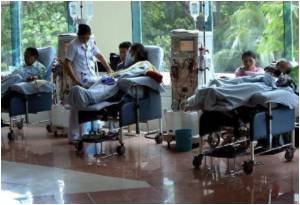St.Michael's Hospital researchers have found more evidence of the benefits of doing home dialysis for patients with kidney failure.

This is important for patients with kidney failure, which causes damage to the endothelial cells that line blood vessels and help control the flow of blood. While standard dialysis in hospital is helpful for treating kidney failure, many patients still develop blood vessel damage that can lead to problems with walking or even amputation.
Dr. Yuen studied the function of cells called early-outgrowth endothelial progenitor-like cells (EPLCs). These cells, found in bone marrow and in the blood, can protect damaged endothelial cells and promote the growth of new ones, leading to healthier blood vessels.
Dr. Yuen compared patients who receive home dialysis at night with patients receiving standard dialysis three times a week in hospital. He found that EPLCs from patients receiving home dialysis promoted new blood vessel growth better than EPLCs from patients on standard hospital dialysis.
The results of his research appear in the June issue of the Clinical Journal of the American Society of Nephrology.
In his study, done in collaboration with the University Health Network, Dr. Yuen injected EPLCs from people receiving hospital dialysis into rats with blood vessel damage. He found no added improvements in blood vessel growth or blood circulation.
Advertisement
Since home dialysis lasts for six to eight hours a night, five to six times a week, the toxins and other waste products that build up in kidney failure are more effectively removed, he said. The greater removal of these toxins may be responsible for the better function of EPLCs from patients on home dialysis, he said.
Dr. Yuen said his study suggests that frequent nighttime dialysis might be better for some patients with blood vessel damage. Nocturnal home hemodialysis originated in Toronto in 1994 at the Wellesley Hospital, which later merged with St. Michael's. St. Michael's also offers conventional hospital dialysis as well as another form of home dialysis known as peritoneal dialysis, in which cleansing fluids are pumped into a patient's abdomen through a catheter tube and waste products are drained several times a day.
Previous research has found that in addition to the convenience, patients on nighttime home dialysis feel better and have more energy when compared with patients who undergo conventional hospital dialysis.
Source-Eurekalert








